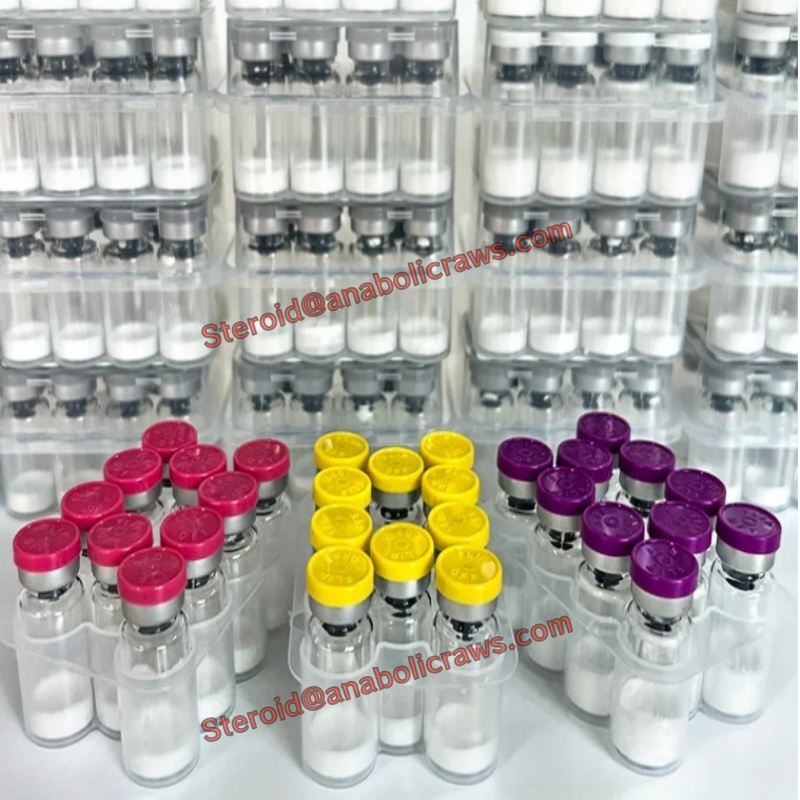Répatrutide peptidique 5 mg / flacon 10 mg / 15 mg / 20 mg / 30 mg perdre du poids
RawSteroidPowder qui a 10 années d'expérience dans ce secteur, Coopérer avec de nombreux laboratoires et homebrews ces années-ci et avoir une coopération à long terme. Qui ont une chaîne commerciale complète d'usine de matières premières, transitaire, demande du client.
De nombreux commentaires de nos clients nous permettent de savoir ce que nous faisons de mieux et comment travailler en toute sécurité et fournir des prix compétitifs et de la poudre brute de haute qualité..
WhatsApp / Signal :+852 5962 6190
Télégramme:https://t.me/AnabolicRaws
Email:Steroid@anabolicraws.com
toile:www.Rawsteroidpowder.com
- Description
What is Retatrutide?
Retatrutide is a notable triple-agonist peptide, which means it targets three different hormone receptors: GLP-1 (glucagon-like peptide-1), GIP (gastric inhibitory polypeptide), and glucagon. These hormones play vital roles in regulating blood sugar, appetite, and energy expenditure, making Retatrutide a promising candidate for treating obesity and potentially type 2 diabetes mellitus.
Méthodes
How does Retatrutide work?
Retatrutide is an innovative peptide with a complex mechanism of action, making it highly effective for weight loss and diabetes management. It functions primarily through three mechanisms: as a Gastric inhibitory polypeptide receptor (GIPR) agonist, it enhances appetite suppression and prevents fat accumulation by improving the body’s response to insulin. As a Glucagon-like peptide 1 receptor (GLP-1R) agonist, retatrutide stimulates insulin release in response to high blood glucose levels, simultaneously reducing the release of glucagon, which helps in balancing glucose metabolism. Finally, its role as a Glucagon receptor (GR) agonist decreases glucagon release, aiding in lowering blood glucose levels and supporting weight loss. These combined actions target different aspects of metabolic and appetite regulation, positioning retatrutide as a superior treatment option in the realms of obesity and diabetes care.
Retatrutide and Weight Reduction Research:
Retatrutide has been showing promising results in aiding weight reduction, especially in the context of obesity and related conditions, according to clinical trial data available up to my last update in April 2023. In these trials, participants receiving retatrutide exhibited significant weight loss compared to those on placebo or other weight loss medications, highlighting its effectiveness.
Moreover, retatrutide has demonstrated a positive impact on various metabolic parameters, including cholesterol levels, blood pressure, and glycemic control, which is beneficial for patients with obesity-linked conditions such as type 2 diabetes and hypertension. A key factor in retatrutide’s success in weight management is its ability to regulate appetite. By targeting specific receptors, it reduces hunger and increases satiety, leading to a decrease in calorie intake and consequent weight loss.
Additionally, there’s evidence to suggest that retatrutide influences fat distribution and accumulation, potentially improving overall metabolic health and reducing risks associated with fatty liver disease and cardiovascular issues. In comparative studies, retatrutide often outperforms existing weight loss treatments, marking it as a significant advancement in obesity management.
Retatrutide and Blood Sugar Research:
Retatrutide plays a pivotal role in improving blood sugar levels, primarily through its dual action on the hormone’s insulin and glucagon, which are crucial for maintaining glucose homeostasis. As a GLP-1 (Glucagon-like peptide-1) agonist, retatrutide enhances the release of insulin from the pancreas. Insulin is a hormone that lowers blood sugar levels by facilitating the uptake of glucose by cells, thus reducing its concentration in the bloodstream. At the same time, as a Glucagon Receptor (GR) agonist, retatrutide effectively reduces the release of glucagon, a hormone that typically increases blood sugar levels by stimulating glucose production in the liver. The reduced release of glucagon complements the insulin-enhancing effect of retatrutide, leading to a more balanced and effective control of blood sugar levels.
This dual mechanism is particularly beneficial for individuals with diabetes, where the regulation of blood sugar is a critical aspect of disease management. By simultaneously boosting insulin release and suppressing glucagon secretion, retatrutide ensures a more stable and healthier blood sugar level, which is essential in reducing the risk of diabetes-related complications and improving overall metabolic health.
Retatrutide and Blood Pressure Research:
Retatrutide’s role in improving blood pressure is closely linked to its effectiveness as a weight loss drug, primarily by addressing obesity, a key factor in hypertension. By decreasing energy intake and increasing energy expenditure, retatrutide facilitates significant fat loss, a process that is directly associated with the reduction of blood pressure. Obesity often leads to increased strain on the cardiovascular system, and reducing body weight can alleviate this strain, thereby lowering blood pressure. The mechanism through which retatrutide promotes weight loss involves both the suppression of appetite and the enhancement of metabolic efficiency. As individuals lose weight, there’s a corresponding decrease in the workload on the heart and blood vessels, leading to improved blood pressure readings. This is particularly crucial for individuals with obesity-related hypertension.
The connection between weight loss and blood pressure reduction is well-established, and the effectiveness of retatrutide in facilitating this weight loss positions it as a potentially beneficial treatment for people with hypertension. This dual benefit of managing weight and concurrently improving blood pressure levels highlights retatrutide’s potential as a comprehensive treatment option in the broader context of cardiovascular health and metabolic diseases.
Conclusions
Peptides buy retatrutide peptide from china, Retatrutide 5mg, tirzepatide for weight loss, Retatrutide side effects, Retatrutide benefits, How does Retatrutide work, retatrutide peptide supplier
ENVOYER UNE DEMANDE
Produits connexes










